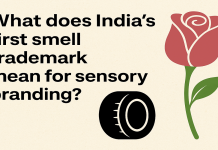This article is written by Manya Sikka, pursuing a Diploma in Intellectual Property, Media and Entertainment Laws from LawSikho. This article deals with one of the most famous cases of trademark infringement.
It has been published by Rachit Garg.
Table of Contents
Introduction
A trademark aims to increase consumer welfare and captures attention to make the product stand out. They ensure the consistent level of quality of the product, which builds consumer’s trust in the product.
The doctrine of initial interest confusion is a deceptive method to deceive the buyer into buying the product and cause confusion among the population. They use the dilution theory to confuse or diminish the public’s perception of the famous mark. They use a trademark or trade name in commerce that is sufficiently similar to the famous mark of that association. In this case, “Rajnipaan” misled the buyers to turn “Rajnigandha” customers towards their product.
Facts of the case
Dharmapal Satyapal Limited was founded in 1929. It’s a multi-diversified corporation that commenced in the industries of food and beverage, confectionery, hospitality, mouth fresheners, pan masala, tobacco, agroforestry, rubber thread, and infrastructure. Primarily, they received a trademark for the mark “Rajni” in 1980 and later obtained a trademark under the name “Rajnigandha” in 1983.
In the case of Darmapal Satyapal Limited vs. Sunil Kumar Rajput, the court declared the mark “Rajnigandha” as a well-known trademark under Section 2(1)(zg) of the Trademark Act, 1999.
The defendant, Youssef Anis Mehio, launched a product of paan masala under the name “Rajnipaan” with deceptively similar packaging, color scheme, and font, which make it difficult for consumers to differentiate between the products. The defendant only replaced “Gandha” with “Paan” with the intention to ride upon the goodwill and reputation of “Rajnigandha”. The defendant is selling a product that is much inferior in quality to the product of the plaintiff.
In respect to their unique design, effect, sign, graphics, and style. The logos are artistic works under the definition of copyright, and the plaintiff’s company has owned the copyright over their logos since 1980.
This is a known fact that many purchasers in India do not know the English language or the language in which trademarks are written, and many of them are illiterate, They cannot tell a difference between these products, which is causing the plaintiff to suffer irreplaceable losses in business as well as injury to the goodwill of their trademark and the reputation of their product.
Issues
- Whether the defendant is liable for trademark infringement
- Whether the doctrine of initial interest applies here
- Whether the defendant’s action amounts to passing off
Arguments

The party became liable when they in any way became part of the infringement, and all the defendants became liable when they infringed on the trademark of Rajnigandha by using likely packaging for their product.
Initial interest confusion is a legal doctrine under the Trademark Act of 1999 that permits the finding of infringement when there is temporary confusion that is dispelled before the purchase is made and the likelihood between the two goods makes it challenging for the consumer to distinguish amongst the products.
Passing off is defined under Section 27 of the Trademark Act of 1999, which refers to passing off goods or services provided by another person. They make a false representation and trick customers into believing that the goods or service are from another person. As in this case, the defendant also depends on the reputation of Rajnigandha to sell his own products.
Judgement
In the Delhi High Court, a suit was filed seeking a permanent injunction to restrain the defendants and all the others connected to them on this behalf, from manufacturing, selling, advertising, or dealing in this product in any manner. The plaintiff also prohibits “Rajnipaan” from using any word, including “Rajni” or “Rajnigandha” the color scheme, or any other mark that is deceptively similar to the product of “Rajnigandha”.
The plaintiff has been able to show that the defendant infringed the registered trademark by selling similar products with the identical trademark.
The Delhi High Court judge, Jyoti Singh J., held the defendant guilty of infringement by dishonestly adopting a similar trademark and intentionally taking advantage of the prominence of the plaintiff goods.
The defendants chose to deliberately stay away from the proceeding despite various legal notifications. The court ordered ex-parte and interim injunction in favor of the plaintiff on November 29, 2018.
The court awarded 3 lakh rupees in damages to the plaintiff for the dishonest adoption of their trademark by the defendant. The case rests on the principle of initial interest confusion and the assumption that the infringement may be based upon confusion as no actual sale is made.
The order also states that the prayer for damages could not be entertained as no stocks were recovered or seized from the premises of the defendant by the local commission, which was appointed by the court to look into that matter.
Similar Cases
Marico Limited vs Agro Tech food limited (1st November, 2010)
The appellant filed a suit against the defendant, accusing him of using a similar trademark. The plaintiff claimed that they have registered the trademark under the name of LOSORB or LO-SORB, and the respondent has an unregistered trademark under the name of LOW ABSORB.
Plaintiff claimed that the terms LOSORB or LO-SORB are used for eligible oil, which is the technology for low oil consumption. The defendant is also selling the same product with a similar trademark, which causes initial interest confusion in this case.
The court ordered an ex-parte interim order in this case.
Dhunseri Tea & Industries Limited vs Dhunsiri Plantation Private Limited
The plaintiff filed a suit for declaration and permanent injunction against the defendant.
The plaintiff company exists within the limits of the Company Act, 1959. The petitioner has had a high reputation for selling and manufacturing tea since 1916, and the petitioner has been using the mark “Dhunseri” since then. They provide a high and non-compromising standard of quality to their customers. It is highly demanded and reputed in India because of the quality of the product.
The plaintiff argued that the defendant adopted this trademark wrongfully and with an ill motive to ruin the reputation of the petitioner and trick customers into buying their product.
Both parties had applied to register the trade under Section 21(3) of the Trade and Merchandise Mark Act, 1958.
The plaintiff was granted a temporary injunction and directed the defendant to file an objection to the application within a week of the temporary injunction.
Armour vs. Avengers (December 14, 2020)
A suit was filed by the owner of the company “UNDER ARMOUR”, which is located at 102, Hull Street, Baltine, MD 2123, US. It is a registered company under the laws of Maryland, United States of America. The plaintiff has offices in many parts of the world, and he runs his business in India through the medium of the Internet. They deal in the manufacturing, selling, and distribution of various products related to sports like footwear, t-shirts, caps, jackets, and other accessories. The plaintiff has authorized Mr. Narender Singh to institute, verify, and pursue the present suit.
They have a wide market in India and their growing popularity over the years makes them most popular and prestigious marks in India because they provide the best quality of products to their customers
In the month of June 2018, it came to the knowledge of the plaintiff that the defendants were dealing in manufacturing and selling the products of similar trade to the plaintiff. The plaintiff himself went to the defendant’s premises and bought a t-shirt from him that bears the identical trademark; the defendant’s fabric appears to be of average quality. They did not issue any receipts or invoices for the product’s sale to the customer. They have a huge stock of different categories that all bear the identical trademark.
The huge loss to the business is also an injury to their goodwill and reputation, and if the defendants keep continuing their business, it will cause more harm to their upcoming business opportunities.
Thus, the plaintiff claims relief pertaining to the infringement of copyright in logos under the Copyright Act, 1975. The plaintiff pleaded for an immediate order of injunction as well as damages in the suit.
The plaintiff was awarded one lakh and eighty-five thousand rupees (1,85,000/-) damages. The plaintiff failed to provide any evidence regarding the loss of their business through sale infringement by the defendant; therefore, relief cannot be granted to the plaintiff for the same.
Conclusion
The defendant dishonestly adopts a similar mark to “Rajnigandha” and just swaps “Gandha” for “Paan”. The plaintiff filed a suit seeking a permanent injunction to prohibit the defendant and all the others connected to them from communicating in this matter through any medium. The court ordered an ex-parte and interim injunction in favor of the plaintiff. The court awarded 3 lakh rupees in damages to the plaintiff for using deceptively similar marks.
There are many issues like this where people dishonestly or unknowingly infringe on the trademark of another person. For example, in the cases of Marico Limited vs. Agro Tech Food Limited (1 November 2010), Dhunseri Tea vs. Dhunseri Plantation Private, Under Armour vs. Avengers (December 14, 2020), and so on.
Students of Lawsikho courses regularly produce writing assignments and work on practical exercises as a part of their coursework and develop themselves in real-life practical skills.
LawSikho has created a telegram group for exchanging legal knowledge, referrals, and various opportunities. You can click on this link and join:
Follow us on Instagram and subscribe to our YouTube channel for more amazing legal content.
 Serato DJ Crack 2025Serato DJ PRO Crack
Serato DJ Crack 2025Serato DJ PRO Crack










 Allow notifications
Allow notifications


